a webzine about THE POWER FANTASY, the ongoing Image comic from Kieron Gillen and Caspar Wijngaard.
Don't wanna be here? Send us removal request.
Text
With The Power Fantasy #9 newly out, I wanted to remind everyone that we at The Power Cut run a Discord server, if you're interested in discussing TPF or even contributing to future zine issues! Here's our TPC masterpost with links to the server, and also the rest of the zine if you're curious.
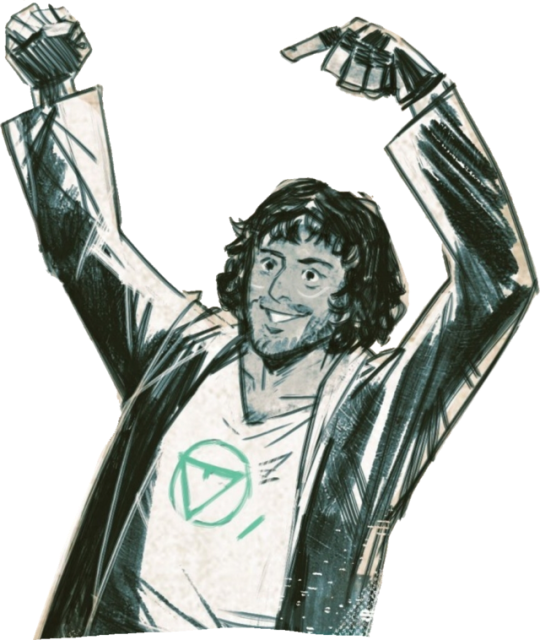



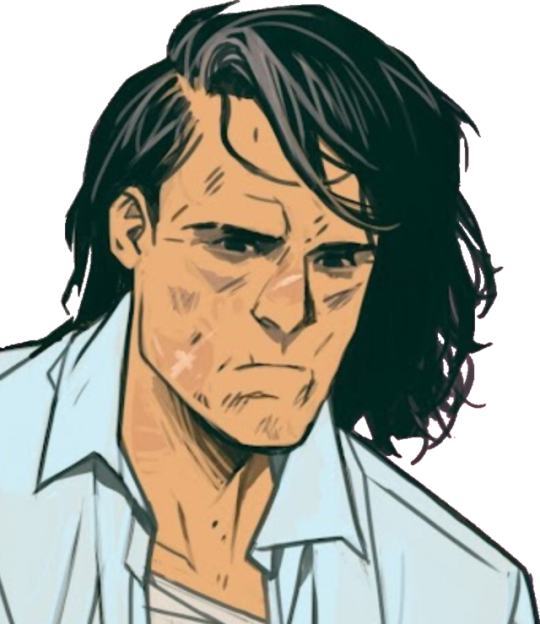
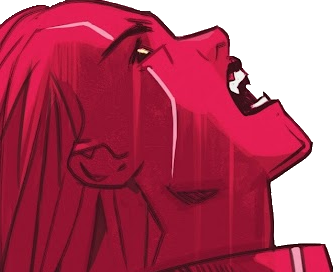
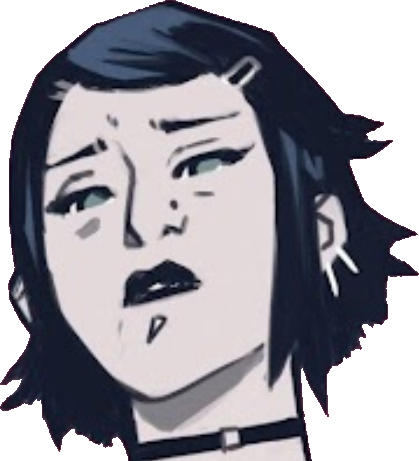
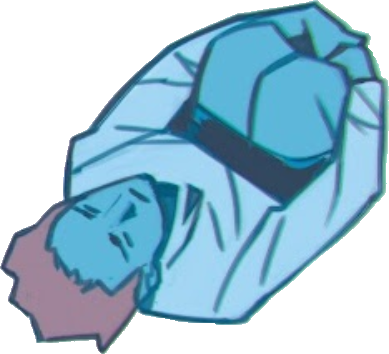
I'd also like to show off some of our custom emoji made by server member Max Meshaka ( @mandarbmax ). Yes, these are all super fun to use, especially that first one imho. Come have conversations with us where you can react with these!
19 notes
·
View notes
Text
Afterword: What Do You Do When The Music Stops?
By Tamsyn Elle ( @meserach ) with illustration by @tazmuth
This essay was originally published on February 14th 2025, in issue #1 of THE POWER CUT, a fanzine about The Power Fantasy, the Image Comics book by Kieron Gillen and Caspar Wijngaard. You can find that zine free to download right here.

World out there is a bit bleak, isn't it?
When I first thought I'd write something about the Power Fantasy I thought it'd just be me, maybe just an essay or two on a blog or Tumblr, or even just a Bluesky thread. At most a mini-zine of my own writing illustrated with screenshots. But looking around the world over the last few months, I found that what I really wanted right now wasn't just a project to throw myself into, but a community that wanted to create something. So I opened it up, let people in, and it was the best decision.
What we ended up somehow pulling together at what was pretty short notice is vastly more ambitious, successful and just plain cool than I could ever have imagined when I started out.
We've had a lot of time in this issue to talk about the more difficult aspects of the personalities at play in The Power Fantasy, but these are admirable people too, in their ways. Valentine's Day is a good time for a love letter, and I hope that's what this zine is, but I also hope it has some of the energy of the comic it's about, and reflects some of those qualities: Heavy's do-it-yourself ethos and animating fire, Etienne's intelligence and insight, Masumi's absolute insistence on art, creation and communication, Jacky's punk roots and shambolic irreverence, Eliza’s courage and belief in something, and most of all Valentina's love for what humans create.
We want to make more of these zines, and we want to see the fandom grow too. To that end, we extend an invite here and now to you, the reader, to come join us on our socials::
Discord: https://discord.gg/YWWP2AQRhp
Tumblr: https://www.tumblr.com/thepowercut
Bluesky: https://bsky.app/profile/thepowercut.bsky.social
Instagram: https://www.instagram.com/thepowercutfanzine/
Email: [email protected]
You can join or utilise any or all simply as a fan of the comic or even (could it happen?) as a fan of the zine, but we're also looking for more people to contribute. If you have something to express about The Power Fantasy, and you either have or want to develop skills in writing, visual art, design, magazine layout, or any kind of creative outlet at all, we'd love to hear from you. Contact us, hang out, tell us what you'd like to see in the next issue, and let's make things together.
Speaking of that next issue: the aim is to have one of these out either alongside or just after the release of each trade paperback. As such, issue #2 of THE POWER CUT will be in your digital mitts some time in July 2025, or thereabouts, depending on the comic’s schedule. We'll see you then.
[EDITOR'S NOTE: Based on what we've seen of TPF's release schedule for the next few months, the next issue of THE POWER CUT is going to be a little later than July... but in the meantime, you can still get involved through the links above!]
20 notes
·
View notes
Text
The Funnies
Written and drawn by Jason K. Jones ( @jkjones21 )
These comics were originally published on February 14th 2025, in issue #1 of THE POWER CUT, a fanzine about The Power Fantasy, the Image Comics book by Kieron Gillen and Caspar Wijngaard. You can find that zine free to download right here.



14 notes
·
View notes
Text
The Major: Captain Americana
By Blastweave ( @artbyblastweave ) with illustrations by Blastweave, Jason K Jones ( @jkjones21 ), and @idonttakethislightly
This essay was originally published on February 14th 2025, in issue #1 of THE POWER CUT, a fanzine about The Power Fantasy, the Image Comics book by Kieron Gillen and Caspar Wijngaard. You can find that zine free to download right here.

The X-Men have a fraught relationship with Captain America. It’s sort of inevitable- the man plasters himself in the iconography of a nation that sinks billions in taxpayer money into trying to kill them with giant robots.
He can claim to represent nothing but “The Dream,” commit as much treason in the face of unjust policy as he wants. But as long as he keeps coming back to that costume, there’s a proximity to the status quo that he can never quite shake. On a good day, he’s an ally to the X-Men, but a deeply contingent one (can you spell “respectability politics?”) On a bad day you get Avengers vs X-Men. And setting aside Rogers as an individual, mutant-kind lives under the threatening shadow of the superheroic archetype he was designed, in-universe, to fill- the archetype of the super soldier. How many stories feature mutants press-ganged, brainwashed, vivisected by human governments out to produce a second Captain America- one who’ll consistently follow orders this time?
Good intentions aside, the very premise of Steve Rogers draws attention to something every halfway realistic superhero setting eventually has to negotiate; if superhumans were real, and combat effective, the Pentagon would stop at nothing to find one that they could paint in their colors and aim like a bomb.

Cap’s own publication corpus tinkers endlessly with this tension in-house- the gulf between how Steve Rogers is presented to us, and how you would realistically expect a superpowered agent of the US government to behave. But no matter what criticisms are leveled at the government, market pressures conspire to bring Cap as an individual out the other side of these stories sympathetic and politically palatable. Indie cape excursions are under no pressure to do the same, and thus have historically tended to go for the throat in how they decry the American super-soldier archetype and its relationship to American power. Watchmen’s Comedian, The Boy’s Soldier Boy, James Gunn’s iteration of Peacemaker, 20th century Men’s American Dream- all different angles of attack on this archetype.. Gillen has played in this space with Uber and to a lesser degree in Peter Cannon, Thunderbolt. And in The Power Fantasy, he circles back for round three with The Major- “The One Man Arsenal of Democracy.”

Beat for beat, Major Glen Campbell is an aesthetic inversion of Steve Rogers. Brunette to his blonde, wiry to his adonis build, highranking commissioned officer to Cap’s loosely defined NCO status. Where Cap is a free spirit, Campbell is a company man to the core. Cap wears a costume that’s also unmistakably body armor; an implicit acknowledgement of vulnerability. Campbell is only seen in formal military dress uniform (on a poster) and, at the 1981 meeting, in casual sitcom patriarch chic- a presentation that’s nonetheless equally tied into American iconography, if a little less overtly.1950s V-neck, fucking golf pants. Cap carries a shield, to protect himself and others; Campbell carries around a golf ball, just so you know where he’d rather be, just how seriously he isn’t taking this. Cap is an inspiring, humble presence; Campbell drips with an oily superiority. This guy is the snivelling pentagon appatcheratik Cap punches out to resolve the latest Hydra Coup. This guy is the American commissioned officer with the self-flattering mythology sandblasted off, as he’s actually experienced by the rest of the world- a deceptively genteel, morally bankrupt middle-class attack dog, grown in a think tank, planted in Langley, hitting the back nine after a long day of raining hellfire on innocent people around the world. All positioned opposite the rest of the Superpowers at their most collectively countercultural, at the point they’re acting most like a unified team. Avenger vs. X-Men.
What’s especially interesting here is that this is a setting where real superhumans explicitly postdate the fictional concept of superheroes by a couple of decades. Captain America saw publication in this universe. In issue 2, Magus refers to The Major as “Captain Arsehole;” everyone knows exactly what idiom Campbell and his handlers are trying to lean into here, with this presentation. Captain Americana, here to help Reagan roll back the clock to the 1950s- the last decade before The Superpowers were in the public eye. For ten years, everyone let it play out, because a certain level of power buys you the right to lean into whatever idiom you want. When you can “kick the world’s ass,” whatever name you answer to becomes your superhero name; a dated V-neck and golf pants turn into a costume. Certainly, the other four superpowers of 1981 have got their own meticulous idioms going on; clothes that become costumes, names that aren’t names.

Until, of course, they find out that he was never really one of them- just a tourist, the way Steve Rogers is doomed to be a tourist in the X-books- and Heavy turns him into a meatball as fast as Magneto should be able to crush an ostensibly normal man in full-body chainmail. A yuppie wearing throwback menswear is pulverized by a guy who looks like the front man for a hair metal band- 50s culture decisively murdered by 80s counterculture. We never even find out what his power was, other than “not enough.”
Campbell lasted two pages- exactly as long as was necessary to establish that no matter how badly the United States would want their Captain America to answer the X-Men, such a figure never belonged in a story like this. But his shadow hangs over the rest of the book, because this guy existed for ten years, shaping the dynamics of the superpowers deeply in ways only briefly alluded to. In particular, he shaped his successor, Jacky Magus.
Magus is the one who blew Campbell’s cover as a sub-superpower and got him killed; we learn this three issues after Magus declares The Major’s death (and implicitly, his own hand in it) as a cause of the disaster that was the Second Summer of Love. He claims that without the paper tiger threat Campbell presented, the remaining superpowers became in some way “too aligned” to respond to the threat effectively. He killed Campbell; but after the Second Summer, he moves to succeed him. Following Campbell’s death, every attempted counter deployed by the Americans comes from Magus. Under-the-table kill sats floated to the Americans for use against Heavy, mech-suits and personal psychic shielding provided for use against Lux. Raw, industrial power stripped of American iconography and individuality, fielded recklessly by a government desperate to prove they’re still a contender. All this culminates in an official alliance and a presidential run by Magus; an American-aligned Superpower who very literally draws his power from the devotion of rank-and-file American soldiers, in a way that Campbell never could.
The Major is dead, sure, but Captain America has died before as well. And no matter how bad the idea, no matter how morally bankrupt- no character stays dead in comic books forever. Not if it’s profitable to bring them back.

51 notes
·
View notes
Text
Eliza Hellbound: At Cross Purposes
By @idonttakethislightly with illustrations by Jason K Jones ( @jkjones21 ) and @idonttakethislightly
This essay was originally published on February 14th 2025, in issue #1 of THE POWER CUT, a fanzine about The Power Fantasy, the Image Comics book by Kieron Gillen and Caspar Wijngaard. You can find that zine free to download right here.

As Jacky Magus gives a speech congratulating the Pyramid's newest Arseholes on their promotion, we get a look around at some of his listeners. Most of them look attentive, deep in thought, maybe a little nervous. They vary in gender, race, and the way they dress, but they're largely "punks who read books and hate power." The exception is Eliza, standing out from the crowd with her crossed arms and scowl, looking unlike any others in a neat white dress and a prominent cross necklace.
Eliza spends most of the rest of that evening calling out Magus on his hypocrisy, speaking up in a way the other Arseholes don't. She points out how he's hoarding and gatekeeping power, in betrayal of his Anarchist ideals. He admits to what he's doing, but claims that it's necessary. What Magus doesn't do is call out Eliza on her own inconsistency with stated values: if she's so opposed to the way he runs his organization, why is she sticking around and climbing through its ranks?

As readers of an ongoing serial story, we can't yet say for sure what Eliza's motives are. But her 1978-era membership in the Pyramid isn't the only time she cooperates with someone whose choices she vocally disapproves of. Her frustration with them seems to be grounded in her Christian faith, but we've seen much more of the judgement she passes on others than her own actions. Of course, there's a lot we haven't seen about Eliza yet, and there's some implications of big choices happening just off-panel. But so far, her most distinctive trait is her willingness to speak out against other people's choices, yet work alongside them.
In 1999, Eliza appears to still be closely allied with Magus. He says, "I went right, and Eliza arrived to join me." She retorts, "I'm not 'right'. I'm righteous." She doesn't argue with him that they're aligned, but she wants to frame it in moral terms, not political ones. She's the person Etienne asks when he needs someone to rein in Magus's behavior, implying that she has more influence over him than anyone else. She also doesn't fight Etienne on a decision she clearly dislikes, telling him "You're going to hell," but not actively stopping him or refusing to deal with Magus. In these cases, it seems like she's going along with other people's plans to keep the peace- to avert the apocalypse, Etienne needs to appease Heavy and Magus needs to stay out of it. Eliza's willing to tolerate choices she sees as morally wrong- but not willing to stay completely silent about it.
But Eliza does more than just go along with other people's plans- at one point, despite her consisten Christian theming, she chooses to sell her soul to the forces of Hell. We don't know the details, but it seems that she got Superpowers and a changed appearance in exchange for an afterlife in Hell (as implied by her full name being "Eliza Hellbound" by 1999.) Her choice was part of what stopped the Queen from destroying the world entirely, but we don't know exactly how. We don't know the details about what Eliza believes, or what Magus has taught her about Heaven and Hell. Still- someone with such strong ties to Christianity choosing to bargain with demons seems like a willingness to work with the opposite side.

So how can these later events inform a reading of Eliza's early-on participation in the Pyramid? It seems like Eliza, despite her differences from Magus, is like him in some ways- she has her principles, and expresses them loudly, but is willing to act in opposition to them for the greater good. Maybe Eliza's choosing to deal with Magus's hierarchy and hypocrisy because she's waiting to learn powers that will enable her to do good?
In that case, I think it's important to look at the diagram of "Secrets Revealed" to Pyramid members at different levels. As an Arsehole, Eliza's apparently been taught the powers of telekinesis, flight, violent abilities, and certain telepathic abilities. The Pyramid diagram does seem for real in that Fucking Arseholes do learn how to sell their souls, so the rest seems likely enough to be true. Presumably, Eliza's not telepathic on Etienne's level, or telekinetic and violent on Heavy's level- but that's still a lot of power.
When Eliza zaps through the sky, appearing next to Magus as he mourns for Europe in 1989, the visual effect of her powers is a cross cutting through the sky. When she zaps out of the conversation with Magus and Valentina in 1999, the effect is a crackle of red fire. We've seen the toll it takes on Magus to continually act against his principles- we barely know anything about Eliza's inner life. Maybe her continual cooperation with those she sees as immoral is also against her principles? The change from a Christian symbol of virtue, to a symbol of damnation, might say so.
But just before Eliza leaves that conversation, we see her through Magus's power-sensing magical vision. Her body is split down the middle- half black on a green background, half green on a black background. Maybe Eliza's skill with cognitive dissonance- speaking against someone's choices while acting to support them- has become core to her value system? But Magus says, "you're the same as you ever were." Paired with Eliza's choices, that makes me wonder if she's held that value all along.
6 notes
·
View notes
Text
Valentina: Angel Alienated
By @khepris-worst-soldier with illustrations by Jason K Jones ( @jkjones21 ) and @idonttakethislightly
This essay was originally published on February 14th 2025, in issue #1 of THE POWER CUT, a fanzine about The Power Fantasy, the Image Comics book by Kieron Gillen and Caspar Wijngaard. You can find that zine free to download right here.

The Power Fantasy is a cynical work. More than a deconstruction, The Power Fantasy is not written in the romantic mode typical of cape comics, but a realistic mode; it is a de-romanticisation. So, when Etienne describes Valentina as “our idealist” to Tonya he is more than merely describing her disposition; he is communicating to the audience that she is out of place in this world.
She does not fit. The audience, of course, already suspects this; we have already been told that she is an angel (although this might read as metaphorical at first). And it is true; despite a strong desire to fit within the world, Valentina simply does not fit.
Valentina is filled with a great love for humanity. She spends her childhood going from house to house, family to family and this impermanence does not, at it would to most, cause her sadness. Rather, she appears to find happiness in exposure to such a wide variety of people. She parties. She listens to music. We are introduced to her eating a slice of pizza on a city corner, about to go to a concert. She cannot escape her status as a Superpower, however. It imposes. Her carefree gallivanting childhood was interrupted, and ultimately brought to an end, by the emergence of ‘The Devil’, as, to save the world from falling under his yoke, she was required to reveal herself. A night of joyous partying at a music festival in the New Mexican desert is interrupted by a nuclear assassination attempt against her. And, in her introduction, she did not end up going to that concert; Etienne disrupted that plan through forcing a discussion on his plans for world domination. Valentina attempted to live an ordinary life, among ordinary people, only to be shown time and time again, that such was impossible as a being with the power to destroy the world.

This alienation is not helped by the fact that ordinary people view her as a saviour. It is easy to understand why; to the ordinary people of The Power Fantasy Valentina has saved the world at least thrice over. The first, serving also as Valentina’s introduction to the world, was her saving the world from ‘The Devil’s’ plan for world domination. The second, was her neutering utterly the risk posed by ICBMs; she would catch the very missiles out of the sky. The third, was her stopping the Cuban Missile Crisis via the destruction of short range nuclear weaponry, both Soviet and American. The ordinary people of The Power Fantasy know, with a certainty no person in our world has felt since 1950, that the world will never end in nuclear fire, not while Valentina lives. Nor will they ever be ruled by a powered dictator. That she calls herself an angel is just the cherry on top. People call her a saint so often that it – in its Portuguese form, Santa – has been permanently affixed to Valentina’s name. This reverence has just alienated her further. Like all celebrities, ordinary people have become unable to interact ordinarily with her; in Musami’s words people “gawp at” Valentina. Such is her desire to avoid this that, next to a mural proclaiming that “New York loves Valentina”, she has Etienne conceal her, hiding them from the masses that stream past them. At Masumi’s art show, prior to Heavy and Etienne’s arrival, Valentina stands alone in a room full of people (some of which are, in fact, gawping at her). Her rejection of the label of saint, so often applied to her, is of such significance that it constitutes her promotional quote: “Oh, honey. I’m an angel, not a saint”. Perhaps the most significant indicator of her alienation is that Valentina has not yet been shown saying a single word to a civilian since revealing herself to the world.
The above, the status of superpower and the resulting reverence, would be enough to alienate most from the mass of humanity, but Valentina, so loving of humanity, required something more to truly cleave her out of humanity. And this, the world of The Power Fantasy was unafraid to deliver. The New Mexico Festival Massacre, in addition to ruining a great night and killing tens of thousands of people, did two things. The first, is that it irradiated Valentina, massively. Although she peed it out in “a week or two” the damage was done; in her anger, immediately after the massacre she confronted the President, resulting in his gruesome death from radiation poisoning. Thus, in addition to viewing her with reverence, a significant portion of the population views her with fear that the same fate shall befall them. This belief clearly wounds Valentina; when Etienne brings up the massacre, she, with anguish on her face, complains about that belief prior to dismissing the subject. How can you be amongst people if they think that that will result in their deaths? The second and most significant thing that the massacre did, is that it convinced Valentina that it was not safe for her to be around humanity. There would be more attempts to kill her. There would be more massacres. The only solution that she could see was to exile herself from humanity, for the sake of humanity. The only way she could continue to love humanity was through abandonment of it. From 1969 Valentina has lived a solitary life on a space station, her alienation from humanity complete. But that is not the final tragedy; her space station is not, like Haven and the (physical) Pyramid, built in a futuristic style unlike anything else on Earth. Instead, on her space station Valentina lives in a typical Western detached house, filled with books and records. Even as she is exiled from humanity, she cannot imagine anything beyond it.

Her alienation from humanity complete, Valentina is forced to exist primarily as a Superpower. But here too she does not fully fit. Here too she is alienated. The existence of the Superpowers is a cynical one, ever concerned with the balancing act amongst the fulfillment of ideological goals. The Superpowers interact not because they want to, but because they have to. Valentina chafes against this. She is an idealist, after all. She is determined to view the Superpowers primarily as friends, possibly partially as a replacement for the humanity she has lost, to the point of failing to engage with them as Superpowers. When she meets Etienne she does not question his proclamation that they should be friends and never questions their friendship even after he states that, from a cynical point of view, they must be friends. When The Major delivered his lists of requests Valentina’s response was to say that she prefers it when they just talk. She interrupts her meeting with Magus to return a record to him. Unfortunately for Valentina, this is not a group of people she can be friends with. As The Major said, “[we] can’t just chew over Galveston’s middle-eight all day, honey”. Any friendship that does exist will always come second to the simple fact of their power and that which the Superpowers seek to do with it. Etienne would prefer to discuss world domination than to go see the Lovin’ Spoonful. To Magus, Valentina returning his record is nothing more than “transparent distraction tactics” from the more important business of Etienne’s growing power. Her friendships with the other Superpowers will always be transient and are often illusory; they cannot escape their status any more than she can. The difference is that most of them don’t want to. By 1999, Valentina does not appear to have any friends amongst the Superpowers. Even her and Etienne don’t get along anymore; most of their dialogue is spent sniping at each other. She is thus alienated from the Superpowers as well as from humanity. Is it any wonder then, that, in ’99, she appears so lonely and anguished? That, in ’99, such a joyous character almost always appears with a frown upon her face?

7 notes
·
View notes
Text
Jacky Magus: Potatoes/Nukes
By @rei-ismyname with illustrations by Jason K Jones ( @jkjones21 ) and @idonttakethislightly
This essay was originally published on February 14th 2025, in issue #1 of THE POWER CUT, a fanzine about The Power Fantasy, the Image Comics book by Kieron Gillen and Caspar Wijngaard. You can find that zine free to download right here.

Jacky Magus, Total Arsehole, is chronologically first seen in 1978 addressing new Arseholes in The Pyramid, an 'Authoritarian secret society' he established in 1971. The data page in issue #3 says that he spent 'years gaining a reputation as an underground guru with an unparalleled understanding of "magic."' He's open about the Pyramid being a cult with him as cult leader, and when questioned by Eliza emphatically admits that he hates it. Magus is openly an Anarchist, admitting his politics are great for 'potato distribution' but not equipped for dealing with 'the nuke in the Rhubarb patch.' That's half a metaphor, but it's also shorthand for the forces that pull at him - his Anarchist ideology and the anxiety of hard power and choices nuclear destruction represents. Other than the 'years gaining a reputation…' we know nothing of Jacky's life before 1978. He's introduced as an Anarchist punk that started an authoritarian cult to maintain his control over "magic." He certainly presents himself as someone who speaks truth, yet he admits to withholding information as it suits him. Jacky repeatedly refers to ‘trust’ as the barrier to sharing information, but he refuses to trust anyone else. He wears a mask for the meeting and enforces the same on his followers to ensure privacy whilst in the Pyramid, though in 1978 the Pyramid meeting is in a dingy squat in Brixton. It's grassroots like he wants to be.
ANARCHISM/ARSEHOLES
Anarchism is an ideology that rejects hierarchy, class, coercion, the state, capitalism, imperialism, etc, and works towards self governance and volunteer free association. It's fundamentally incompatible with not just his actions and the Pyramid, but his entire existence. After all, Jacky Magus is a Superpower - an individual with the destructive capacity of the US's nuclear arsenal. He is inherently more powerful than all but 5 other beings (4 at this point) yet he's telling his punks 'who read books and hate power' to 'slap him down' if he abuses that power. I doubt any of the Pyramid could harm him. After all, it 'comes with an off switch.' Even at this early stage, he's trying to live by Anarchist ideals while embodying the power of a state. He seems serious when he says 'All we do, we do together' but it's likely he's trying to convince himself he can have it both ways.
Jacky Magus can hold Anarchist ideals but he's incapable of praxis. His personal level of power warps his every interaction and dynamic. Authoritarianism and Anarchism are oxymoronic, naturally opposing one another (just ask a Marxist.) Jacky Magus is a study in contradiction and power. Plenty of punks and Anarchists sell out, but zero (so far) try to be US president. He's aware of this contradiction, hanging a lampshade on it. Considering we see Jacky at several critical points in history between 1978 and 1999, when did he abandon his ideals? Did he ever truly hold them or were they a performative tool? He ends the 1978 cult meeting by declaring that the 'Pyramid will save the world.' It's this statement that suggests his duelling ideals exist dialectically - equality and justice vs the reality of Superpowers.

COPS/CHURCHES
Jacky claims to hate cops (and there's a good chance he used to kill them) while admitting that The Pyramid are the magic cops. He expresses specific distrust of Eliza due to her wearing a button cross yet in the same breath he explains that "Magic" only works because 'Heaven is leaking all over the shop.' That word doesn't mean what we'd assume, but magic and religion are heavily linked in our world. Ritual, community, words and phrases with great meaning, desire for access to higher powers, candles and symbols, and much more. In the abstract, there's no difference between a prayer and a spell or incantation - an invocation to higher power.
In TPF, "Magic" is scientifically measurable. Valentina's existence is scientifically measurable. Science, magic and religion are at odds in our world, yet TPF suggests a difference in perception and awareness. Jacky holds up Eliza's cross as an emblem of untrustworthiness, but he still created a pseudo religious hierarchy with himself as Pope or even God. He may have saved the world from the Queen during the Second Summer of Love but he 'fried' 250 thousand people - the entirety of the Pyramid - to do it. Eliza (now Hellbound) finds him weeping in the ruins of Eurasia and it's not long before he gets explicit. Magic has a cost and the Pyramid paid it with their lives. Presumably there was no other way, which says a lot about how "magic" works. Jacky does some finger pointing at Eliza but quickly blames himself. Considering that he's just killed a quarter of a million people who trusted him and sits on top of a billion corpses, it's possible his ideals died here - evolving through the crucible of Superpower. He retained his 'save the world' mission but 'went right,' realising how far apart from the rest of humanity he is and embracing his personal Great Man Theory. Saving the world is a great magic trick and a heroic action, but when Anarchism and power were in conflict, he chose power. Another way to put it is that power chose for him. When the continued existence of the world is the stakes, and you alone have the power to save it, it's impossible to pretend to egalitarianism of any kind.
Jacky, and only Jacky, truly knows how "magic" works. His statement that 'all we do, we do together' became horrifyingly prescient in the face of the Second Summer of Love. He knew what it costs to fuel "magic" and intentionally set up a system where he could sacrifice humans to 'clean up the Queen's mess.' I don't doubt his tears were genuine but it's still a choice he had to make. He's also responsible for the birth of another Superpower. He didn't teach Eliza how to sell her soul but he did teach people. As much as present day Eliza has expressed much of anything, she seems to stand with Magus. It's after the Second Summer of Love that The Pyramid becomes more aesthetically literal - in place of a punk squat is a green magitech Pyramid, hovering over the ruins of Europe - above everyone else.
NAZI PUNKS FUCK OFF/NEVER TRUST A HIPPIE
NOFX's Never Trust a Hippie wouldn't come out until 2006, but it had been a punk truism for decades. After failing to convince Valentina to act against her peers, Magus says it word for word in 1999. Valentina has been shown to have ties to Hippie culture but she clearly speaks punk. She hands him a Dead Kennedy's record she borrowed in 1985 and uses the title as a retort - 'Nazi Punks Fuck Off.' He may not be a Nazi but he admits that the Second Summer of Love changed him, so he went right [wing.] 'Never trust a hippie' became a punk motto in response to the previous counterculture - hippies - aging into the establishment and/or compromising with capitalism. The irony of the Second Summer of Love changing the Anarchist punk is that the explosion of rave culture and MDMA that fuelled it displaced punk as counterculture among young people. It changed a lot of people in our world, in The Power Fantasy it killed them. Jacky Magus killed them - and now he's joining the establishment.
When trying to turn Eliza and Valentina against Etienne and Heavy, he switches from argument to argument to emotional appeal and whataboutery. Lies and exploiting information disparity are clearly two of his longstanding tools - designed to maintain his power and encourage others to take the risks he isn't willing to. Like any good magician, misdirection is his best friend, but this magician can and has killed on a staggering scale. That it was in service of saving the world clears him ethically from a utilitarian perspective, but notably the other Superpowers ‘fluffed it.’ He doubled down on his inability to trust, proclaiming ‘it's all down to me.’

MAGIC/ MILITARISM
The Major was a sub-Superpower that masqueraded as the real thing on behalf of the USA for a decade. Seemingly in response to out of control US imperialism, Jacky calls a psychic sidebar with his fellow Superpowers. After a decade of silence, he shares that the Major can be killed by first strike along with proof. Heavy immediately does so, yet Jacky acts disgusted with him. Jacky kept that information to himself for ten whole years then used it to kill by proxy. If not his peers and not his followers, is he truthful with anyone? If he deviates from his cult leader MO, we haven't seen it. Hoarded knowledge, lies and relationships with inherent power disparity - this is how Jacky Magus has operated for at least 21 years. There's no-one he deems worthy of trust. He wears a mask constantly at this point, implied to keep Etienne out of his mind. Other Arcanology makes the wearer ‘protected as well as he is’ but it's not just for privacy and trust. Jacky works to take Etienne and Heavy out and ‘first strike is the only hope a Superpower has’ - so neither man can see it coming.
In 1999 Jacky learns that he and the USA failed to capture Etienne. Upon noting that Pyramid membership/magic fuel is a fraction of its 1989 height, he sets course for the White House. His proposal to 'militarize magic' for the US empire with him ideally in charge is as far from Anarchist ideals as you can get. It does however match with his long standing MO and goal of saving the world. He maneuvers himself towards the head of an organisation with a lot of bodies who'll do as their told up to the point of being 'fried' to work world-saving "magic." Who has more bodies and funding than the US military after all? Even more disturbing is his idea of becoming US president - cult leader and world leader in one. If bodies = destructive "magical" power, his ability to save the world maximised.
'Picking a side' might be one of few true things he's said. His experience in lying to maintain power and using violence on a global scale would serve him well in the position. It's a move that positions him in opposition to his peers, and while he's an arsehole - he's not a fool - especially where his personal safety is concerned. Even if he didn't have checks against the other Superpowers, do any of them really want to escalate with America? If Jacky is part of the military or government then an act against him is an act of war twice over. A deterrent in itself. We haven't seen his face since 1978 but his body language is strikingly casual when proposing his presidency. The Jacky Magus of 1999 feels he's doing what he needs to to save the world, and he's had 21 years to come to terms with being a Superpower in a world of Superpowers. Equality was never an option. Anarchism never had a chance. With his staggering power and nobody he can trust or even confide in, Jacky Magus has gone full circle from Anarchist to Authoritarian. If he could trust his Superpower peers perhaps he could stand with them, but instead he stands in opposition to them.
Jacky Magus picking a side ensures his isolation and consolidation of power. He's been a Superpower for decades while avoiding direct intervention where possible, but now he's said ‘fuck it’ and is embracing his power, his responsibility to save the world. In place of putative equals are faceless servants and ‘people who follow orders.’ Last time he saved the world the body count was astronomical and the stakes are a lot higher now. Nobody should ever have that much power - Jacky Magus’ journey shows us how it inevitably changes everything about you. A lot of people are going to die, and in 1999 he's aware and willing.

15 notes
·
View notes
Text
Lux and Magus: Goodness in a Goodless World
By Joju997 ( @the-joju-experience ) with illustrations by Jason K Jones ( @jkjones21 ) and @idonttakethislightly
This essay was originally published on February 14th 2025, in issue #1 of THE POWER CUT, a fanzine about The Power Fantasy, the Image Comics book by Kieron Gillen and Caspar Wijngaard. You can find that zine free to download right here.

“My politics are great for arranging potato distribution, but not great for dealing with the nuclear bomb that’s turned up in the rhubarb patch.”
Jacky Magus hates who he is and what he does. But as he reminds himself, Eliza, and anyone else who will listen, he is taking the best bad option he has. Knowing that he holds access to untold mystical power, and that it will get out unless he personally holds the line, he builds a cult around himself with intentional callousness.
He’s not alone in self-hating pragmatism. Etienne Lux similarly sees himself as sacrificing his ability to be a “good man,” instead being “stuck trying to be an ethical one.”

There’s a depressing realization the two Superpowers have. There is no way to be a truly good person while holding on to the powers they possess. Their responses to this conclusion frame the first volume of TPF.
The first issue is entirely about Lux doing the most ethical thing he can in the face of an unwinnable scenario. Ultimately, he chooses to decapitate the US government to save as many lives as he can. The fifth issue ends with Magus choosing to take over the government to save as much of the world as possible. Europe is already gone because he could not properly regulate magic, so his new strategy is to take over a country that is not his with a military he is willing to sacrifice.
The first volume of The Power Fantasy starts with the Superpowers destroying the US government, and it ends with them trying to replace it. In both cases, it’s not their first idea, but it’s the one they have to work with.

8 notes
·
View notes
Text
Etienne Lux: Heart of Glass
By Tamsyn Elle ( @meserach ), with illustrations by Blastweave ( @artbyblastweave ), Jason K Jones ( @jkjones21 ) and @idonttakethislightly , plus excerpted panels with art from the comic itself (art there by Caspar Wijngaard) This essay was originally published on February 14th 2025, in issue #1 of THE POWER CUT, a fanzine about The Power Fantasy, the Image Comics book by Kieron Gillen and Caspar Wijngaard. You can find that zine free to download right here.
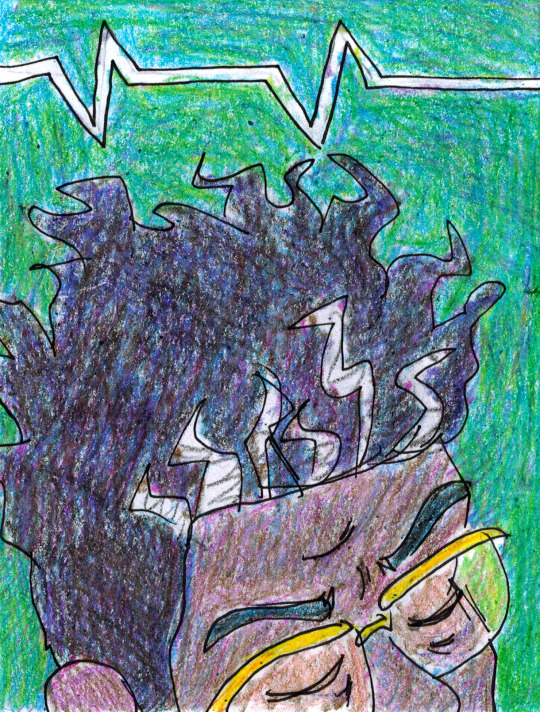
This first arc of The Power Fantasy touches on all of the main cast, but the spine of it belongs to Etienne Lux: telepathic omnipath, problem-solver, negotiator, peacemaker, mass-murderer. We travel with him as he juggles and keeps the balance between the more disruptive forces of the rest of the cast: the threat of Masumi’s monster, Heavy’s reckless temper, and Jacky’s active attempts to capture him. In the plot so far he's the restoring force, keeping the very balance Magus is so worried about: counselling cooler heads, de-escalating, trying to think logically and dispassionately.
This is a role he's crafted for himself; in that conversation in ‘66 with Valentina, he talks about being the public face, the theorist, “someone to contextualise the horrors… but mostly someone that governments can work with”. Even his ostensible surname reflects that role: Etienne is Lux, light, providing information and clarity in a world that's become markedly more fuzzy and magical; but his actions and processes also have a laser-like quality; clean edges, surgical, precise. (Also he's French, and Paris is the City of Light. Well… it was.) A mind like a crystal, refracting light through facets, brilliant in every sense.
Consider, though, what else we know. On a day in 1953 a boy, aged almost certainly no older than five, woke up in a hospital bed and learned two things: one, his parents were dead; two, he was possessed of immense and perfect control of the mind of anyone he chooses to.
This, at least, is the story as we understand it so far. Picture Etienne Lux — if that was his name then — having gone through violent tragedy, dealing with the immense grief of being suddenly orphaned, waking up, bruised, confused and traumatised, and discovering… well, what, exactly?
The exact reach, flexibility and limits of Etienne’s powers as an “telepathic omnipath” remain a mystery, albeit a continually prodded one. Magus tells us he's getting stronger. Valentina insists Etienne could never control her, Magus isn't convinced; presumably, a malefic version of the divine imprimatur that shields Valentina also protects Eliza. Seemingly, he can't control Magus (because of the mask, he implies), but he evidently doesn't control Heavy directly either, even when it would seem to be to his advantage. (What protects Heavy? Just being near his singularity in Haven? We don't know.) And he's unable to penetrate the void of Masumi's mind specifically as a manifestation of her own powers: compared to Lux's light, Masumi's mind is darkness where no light can penetrate.
But the one superpower who's mind he can control is his own, and he suggests (in the conversation with Masumi in issue #2) that he can do so much more perfectly and directly than most humans, as part and parcel of being a telepath; he “keeps himself balanced”.
What could that possibly mean? Anyone who's ever struggled with their mental health, like Masumi, has probably spent at least a little time wishing they could directly take the bad thoughts out of their brain. But Etienne might be able to do just that. He is claiming the ability here to be his own architect; to design his personality from the ground up, to be the person he thinks he needs to be.
Through the comic so far we have watched Etienne be in essentially permanent crisis management mode. The closest thing to genuine rest he gets is sitting for coffee with Tonya, and even then, he was only in the area to tackle Heavy bringing Haven over Manhattan, and he was using the interview as a PR management opportunity. The rest of the time, over the span of maybe a few days at the most, he's entirely putting out fires or saving his own life: negotiating, manipulating, and just plain psychically-adjusting whoever is needed to keep the world turning for one more hour.
Possibly he does outside of this have a recreational life, and time to rest. It makes sense the comic would only show us the more exciting parts of his life, after all. But can he afford to? We've also repeatedly seen Etienne's physical vulnerability stressed, with the attempt to apprehend him at the airport, with his need to call in favour from Valentina to prevent anyone taking down the plane, with Valentina’s moment of nearly killing him in 1966. That interaction told us he claims safeguards, of a mutually assured destruction variety — releasing a psychic contagion if he's killed — but unlike Masumi's more visible dead-man’s-switch monster, this exists in the realm of the theoretical. It’s based on a judgement about what Etienne would actually have done as a moral actor, as opposed to the seemingly entirely inadvertent destruction that would be wrought by killing Masumi, and that’s a fundamentally more nebulous kind of threat. For all his power, amongst the superpowers Etienne is the glass cannon: deadly, but vulnerable, even fragile.
As such, can Etienne allow himself any moments of imperfect vigilance, of weakness? What about personal relationships, love? Any attachments would be a vector to get at him, and he can’t be everywhere. Etienne makes a remark about Masumi bouncing off Buddhism, and he sounds almost scornful of her need for attachment. Has he removed that need from himself?
Does he even sleep?
It's clear one major inspiration for Etienne is Kieron Gillen's time writing Professor X in various Marvel X-Men books, but elsewhere in Kieron Gillen's creator-owned comics oeuvre, I am put in mind of two characters. One is Dionysus from The Wicked and the Divine, a kind of selfless hedonist, a deeply moral individual )in a more instinctive way than Etienne), who also had a kind of psychic power to bring people together, who gave too much of himself to keep that going at any cost, and who didn't — couldn't? — sleep. But the other is Emily Aster from Phonogram (particularly the third and final series The Immaterial Girl), a kind of selfish hedonist, a deeply immoral individual who used magical power to discard an entire half of her personality that was weighing her down.
Spoilers, but it doesn't go great for either individual. If nothing else, Emily Aster had to worry about where the other half of her personality went. Might Etienne have a similar problem? Where do the bad thoughts go? (What is the Signal really, anyway?)
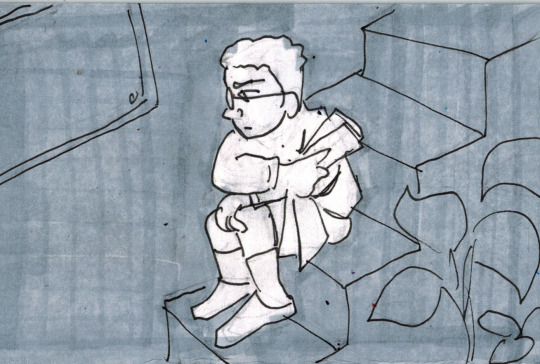
Pull back to that young child, barely in school, who is discovering his power and his loss. What aspects of his own mind might he have decided were dead weight that needed to be discarded, just to survive the trauma of that moment? And then later, having rid himself of pain and coming into his power fully, and realising what it meant, what might he have decided about the person he needed to be?
Later still, in 1966, in issue #1, we see Etienne and Valentina on that street corner. Valentina has not been persuaded of Etienne's benevolent god-queen pitch, and has decided Lux needs to die. But he stops her, with some psychic message we don't see: “Here is who I am.” And a tear, a big deal from someone as mostly emotionally still as Etienne.
Whatever it is, it flips Valentina from avenging to nurturing angel. Immediately she's struck by sympathy for him, with a little horror: “terrible. I mean, difficult.” She addresses him in infantile terms, suddenly — “you poor thing” — as he confesses to some sort of lapse: “I tried to be ethical, as far as I could, but—”.
Doubtless this moment will be revisited, but whatever was imparted here has significant emotional and narrative heft. It can't solely be that he's communicated his ‘safeguards’, given both the break in Etienne's still pool and Valentina's sudden swap from death to hugs. So what could this momentous disclosure have been?
Without doubting the genuine emotion behind it, was this also a formative experience for Etienne in terms of learning how to manage people? He saves his own life with what is, ultimately, an emotional manipulation, finding a means to trigger behaviour in someone he can't control more directly. And we see him later demonstrate the same trick, most obviously with the soldier in the mech suit at the airport, but also in how he sets up a precisely calibrated amount of validation for Masumi's artistic ambitions.
Maybe it started even earlier, though. Issue #3, 1957, Valentina goes to meet Etienne after she's had to reveal herself. Note, though, how carefully he words the observation: “if I'd done it sooner, you wouldn't have had to reveal yourself.” Not ‘I wish I'd done it sooner’, not an expression of regret, merely an observation about conditional statements. Another way to phrase it: if he hadn't done it when he did, she could have remained secret. Instead, Etienne by delaying a little, forced her out into the open. Thus forcing the meeting he thought was necessary so they could become friends, which he also thought was necessary. Not that he admits to any of this, but he doesn't deny it either. But then, lying unnecessarily is unethical…
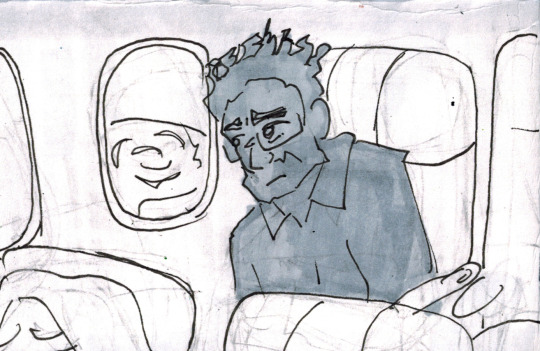
By the time we catch up with him in the present of 1999, Etienne is, well, the scariest motherfucker alive. Heavy claims that when he kills he’s with them, and the level of detail he has about seemingly anyone he chooses to investigate, kept inside an eidetic memory, suggest that on a level of perception at least this is true. See him describe in detail the soldier’s children, and then threaten that they’d open their wrists with their teeth; see him kill a mother with her family at breakfast. Masumi’s question still has force: how can he do what he does? How does he live with it?
He does describe himself as a man with regrets, back in the interview with Tonya. He even calls the regrets personal, yet even there, it’s in terms of evaluation. He could have done it better. It was a failure. All deaths were regrettable. He wants to avoid future mistakes. He’s practically laying out his own improvement plan at an annual job review. It’s a hell of a way to talk about mass psychic murder primarily in terms of how you wish you were better at it. Yet, he seems sincere about wanting to improve. Heavy thinks he’s getting less human, but I think Eitenne sees it as refining himself, and with his power there’s really no limit to where refinement might take him. Self-help doesn’t usually involve being able to rewire the neurons and flush chemicals through the synapses directly, but for Etienne it does. A mind of glass, again: everything transparent and free for vision, weighing, analysis, and he’s so sharp he can cut himself, cut himself right open and carve away what doesn’t serve.
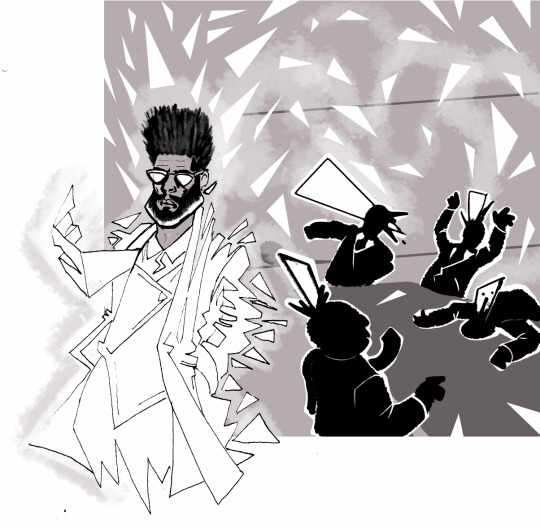
This, then, is the picture of Etienne Lux I see: a person with huge traumas and incredible ongoing stressors, who ordinarily would be a good candidate for some serious therapy, is instead possessed of the ability to shape his own mind however he wants… but that means his own desires are also themselves subject to his will. The snake eats the tail, and Etienne's early decisions about who he wanted to become may end up determining how he acts now. If Etienne concluded that his sense of empathy was an impediment to making a good ethical decision, he could choose to discard it. But having done so, would he ever make the decision to put it back? And if not, what kind of person does that make him now, while he weighs these ethical judgements?
Let's pull back to that child one last time, but back a little further. Why was he in that coma in the first place? The timeline in issue #3 merely says “his parents dead in a crash”, a notably passive phrasing that even omits any sense of what the crash was… or what caused it.
Is it possible Etienne, even at four years old, decided that his own parents needed to die? And if so, what could possibly lead a four year old to that decision?
Regardless of his culpability, though, this moment of the crash must figure heavily in Etienne's psychology. It could well be literally his earliest memory. That sort of thing leaves marks on a person, indelible images of the moments of collision.
Impact. A window breaks. Shards of glass, hanging in the air. Sharp edges and light, the kind that both sees and sears. Shards: beautiful, but broken.
The mind of Etienne Lux.
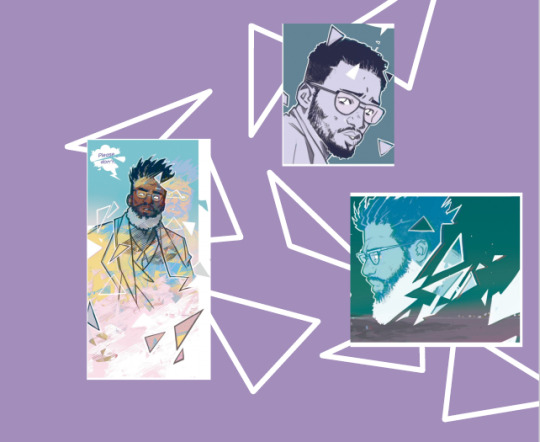
#the power fantasy#kieron gillen#caspar wijngaard#indie comics#image comics#zine#fanzine#fandom zine#essay
40 notes
·
View notes
Text
The Power Cut (masterpost)
The Power Cut is a fanzine about The Power Fantasy. The Power Cut is a collection of meta essays, illustrations, and jokes. The Power Cut contains mature content. The Power Cut is so excited to meet you!
Join our Discord here if you're interested in talking about The Power Fantasy, or even contributing to future zine projects!
ISSUE #1: The Balancing Act (spoilers through TPF issue #5/trade #1)
Downloads:
Google Drive
Dropbox
Individual essays on Tumblr:
Introduction: Dialectical Immaterialism
Morishita Masumi: What the Water Gave Me
Ray "Heavy" Harris: Decked Out
Etienne Lux - Heart of Glass
Lux and Magus: Goodness in a Goodless World
Jacky Magus: Potatoes/Nukes
Valentina: Angel Alienated
Eliza Hellbound: At Cross Purposes
The Major: Captain Americana
The Funnies (single-page comics)
Afterword: What Do You Do When The Music Stops?
13 notes
·
View notes
Text
Ray "Heavy" Harris: Decked Out
By Jay E. ( @idonttakethislightly ) with illustrations by Jason K. ( @jkjones21 ) and @idonttakethislightly
This essay was originally published on February 14th 2025, in issue #1 of THE POWER CUT, a fanzine about The Power Fantasy, the Image Comics book by Kieron Gillen and Caspar Wijngaard. You can find that zine free to download right here.

When Heavy is shot by the US government's orbital laser, his torso is torn apart, and so is his left arm, and so is his bathrobe. In a practical sense, clothing damage is way less of a big deal than bisection or amputation- but in a story as visually dense as The Power Fantasy, Heavy's change in appearance is symbolic of a shift in his point of view.
As goofy as he looks wearing pajamas during the day, Heavy's outfit in that scene is a deeply thought-through rhetorical power move. Losing his bathrobe represents a loss of control over his situation, and his transformation in apparance represents a shift in self-image.
But what rhetorical work was Heavy doing with his bathrobe and sweatpants in the first place? If you consider those clothes as the pajamas they are, worn at a time of day when Etienne and Tonya are fully dressed at brunch, they make him look like a slacker planning to spend the day at home smoking up. But if you look at his outfit in the context of his boxing-inspired hand wraps, he almost looks like a prizefighter preparing for a match, in a warmup robe and athletic shorts.
Heavy's dressed up to match both the arguments he tries on Etienne just moments before he gets shot: for one thing, he's standing up to the government in defense of Atomics, and for another thing, he's not actually doing anything that's a big deal. He's trying to play two contradictory roles- professional fighter and chilled-out slacker- neither of which is exactly true.
Heavy is a fighter, in the sense that he's been in a lot of violent confrontations. But contrary to his appearance, he's fighting for the fate of the world, not for sport. In a situation so high-stakes, nobody bothers with rules or a fair fight. Whether it's Heavy getting shot from behind, or Heavy suddenly killing the Major, Etienne's right that "First strike is the only hope any superpower has." And while Heavy is dressed like someone who fights hand-to-hand, he's actually someone who kills with his mind, from a distance. He crushes a would-be assassin into a ball of flesh without touching or even looking at him. He could have killed everyone in a massive US state. Heavy never has to get up close and personal with the people he kills- while a real professional boxer wouldn't even be trying to kill with the punches they throw.

Heavy is nothing like the kind of fighter he's dressing up as, but it's still useful to him to dress that way. He's cultivating an image of strength- of competence in a fight. Dressing like a prizefighter makes him feel like one, which gives him the courage to take the risks he's taking. The hand wraps are totally unnecessary to his fighting abilities, and for that matter, so is his powerful physique. But his reputation and self-confidence are both founded in toughness and power, which are symbolized by the way he looks.
But his fighter persona is only half of what's going on with his look that day. He's also giving off a lot of chill vibes that are more reflective of self-image than reality. Nobody preparing for a boxing match would keep their hair long and loose like that- there's rules about hair-pulling, but even so, it's not practical. Heavy's long hair is a nod to his hippie roots- a subculture known for valuing peace and love, in contrast with Heavy's violence and anger. He's also got a joint constantly hovering around his head, hinting at a laid-back stoner persona- but he's smoking up so constantly that it reads as a serious addiction, not a fun pastime. And again- he's still in his pajamas by late morning, trying to send signals that he's not doing anything important that day, when nothing could be further from the truth.
It's pretty hard to buy Heavy's assertion that moving Haven into US airspace is "just going for a walk and putting on a show." But Heavy needs to believe that things will be fine- he doesn't want to face the potential consequences of his actions. So he's telling himself a story where he's not actually being aggressive, just hanging out, and the chill vibes he's dressing himself in are part of that.
Heavy is dressing to tell himself a story about who he is- but absolutely nobody else is fooled. In an early panel, we see him standing in front of four beautifully-dressed residents of Haven, all glaring at him. Etienne dismisses all his arguments with "You're stoned and orating a manifesto." He doesn't even bother directly arguing with him. But Heavy speaks and acts like he's all in on both his contradictory points of view.
Then he gets torn apart by the US government's laser attack, proving that he wasn't just hanging out, and that it was never a fair fight. Heavy saves his own life by sealing his body back together with gravity powers- but he loses the bathrobe in the process. When we see him hovering over Manhattan, imploding space stations and demanding the murder of hundreds of people, he's in just his sweatpants. He looks much less like the laid-back stoner, more like the boxer who's taken off his warmup robe to stand and fight.
Heavy's bathrobe was never meant as physical armor- more as psychological armor against the terrifyingly high stakes of his situation. In that outfit, he had the courage to act confident and relaxed, but that self-assurance is ripped away along with the soft fabric robe. He may have been outspoken about his fair-fighter and chill-slacker personae, but the moment push comes to shove, all of that is gone. What's left is his brutal anger, represented by the scars and fresh injuries visible all over his body.
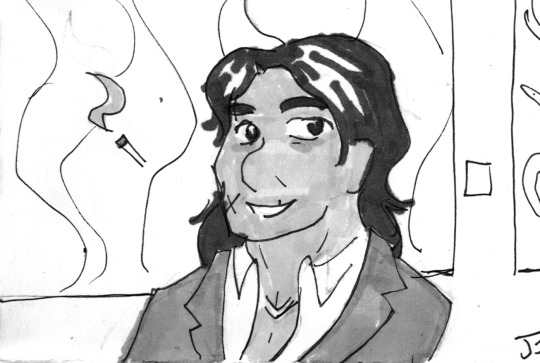
More generally, Heavy is someone who shifts between selves as easy as changing his clothes- we later see him less furious in a nicer shirt and bandages, and eventually he even plays the gentleman in a dazzling lavender suit. At any given moment, he might seem confident in his identity and convictions- but as soon as he's in a different outfit, he's someone else.

So who is Heavy really? Is he most himself when crying, insecure, and totally naked? I see that as one true version of him- but the loud, swaggering Heavy in prizefighter pajamas is just as much a version of his true self, or maybe true selves. As much as Heavy is lying about the reality of the situation- successfully to himself, and unsuccessfully to everyone else- he's being honest about what he wants. He wants to be a hero, someone people cheer for like a favored athlete- and he wants to have peace and safety, so that he genuinely could just stay home and kick back.
So far as we've seen, Heavy hasn't gotten to be either of those people. No wonder he puts so much thought into how to dress up as them instead.
[EDITOR'S NOTE: To see the full version of this last image, which goes a lot lower, check out the zine itself!]

13 notes
·
View notes
Text
Morishita Masumi: What the Water Gave Me
By Jason K. Jones ( @jkjones21 ) with illustrations by Jason K. Jones, @tazmuth, and @idonttakethislightly
This essay was originally published on February 14th 2025, in issue #1 of THE POWER CUT, a fanzine about The Power Fantasy, the Image Comics book by Kieron Gillen and Caspar Wijngaard. You can find that zine free to download right here.

When I think about Morishita Masumi, I feel tears well up. Masumi is a superpower, the youngest on the planet. When she becomes too sad, a kaiju the size of a large city appears to wreak havoc. She’s also an artist. She works on massive canvases that stretch floor to ceiling, creating semi-abstract landscapes infused with shadow monsters and shot through with these absurd pastels intended to convey the scale of the burden she feels and the thin veneer of cheer she has to patch over it. Masumi can destroy the world with her depression, so she has to fight daily to remain happy for everyone else’s sake.
I am a person of little consequence, a middle-aged Millennial sitting just shy of 40. When I become too sad, I turtle up and avoid other people despite knowing that’s not what I need most of the time. I’m also an artist. I work on a tablet, making mostly lighthearted fan art of comic book characters to suit my personal whims and tastes and to entertain other comic book nerds. I can make myself miserable with too much rumination, so I spend a lot of time practicing being mindful.

Aside from the artist thing, we’re not terribly similar people, Masumi and me. Fortunately, there’s a lot in our common drive to make art that I see and love. When Masumi frets over how her show is going to go, contemplating just fading from existence instead of facing public opinion, I totally get her. The worst part of making anything is being done and having to wait for others to tell you what they think. You finished the piece, and now that it’s out there all you have is the time to pick apart the flaws. This part didn’t turn out how you wanted, and that part is okay but now you see what you could have done to make it really shine, and what the fuck were you thinking there, oh god, everyone is going to see what an amateur you are.
And that’s when you think the work is good!
When it’s bad, or more accurately, not what you want it to be, then you find yourself second guessing every kind word that comes your way. Really? This is my best work so far? Are you pulling my leg? Please don’t do that. I’m a craftsperson, after all, and I need honest feedback so that I can get better so that the plasma in my head won’t just dribble out uselessly and make us all sadder for being in the general vicinity of me. It is existentially important to me that you tell the truth about all of my flaws.
So when Masumi flips out because a critic has published a pandering review of her show that must have been written before the critic could have seen it, I see Masumi and I empathize completely. It’s worse than getting panned; it’s out of hand dismissal, a failure to see her.
Of course, fair point to the critic, Masumi can level a city if she doesn’t take a poor review well. She’s not a monster, but the consequences of putting her in a bad mood are monstrous. I’m glad I don’t have that particular albatross around my neck. I wish Masumi didn’t either.

It’s easy for a reader to focus on Masumi’s frustrations as an artist who is forced to work with a limited and poor quality palette. She’s justifiably fascinated with what she could do to the world, but she’s not allowed to really explore how any of it feels. This seems to be what Etienne Lux means when he says that “Truth is beauty and, as we cannot risk her having truth, true beauty will elude her.” He makes a nod to the emotional impact of Masumi’s situation shortly after, mostly to underline that her relationship with her girlfriend Isabella is not authentic in any meaningful way, but Etienne’s chief point is that Masumi’s fulfillment as an artist is secondary to the world’s survival, and that is the primary extent of the tragedy.
I don’t blame Etienne for coming to such an impersonal conclusion. He’s an intellectual, and while plenty of art is intellectual in nature, it’s also overwhelmingly intuitive. Sometimes we make decisions just because they feel right. This intuition that drives creation comes from a deep part of our humanity rooted in our experiences of the world. I draw what moves me, whether that comes from grief or joy because I have experienced all of it, and my art is often about evoking something half remembered but fully understood. The danger inherent in Masumi doing the same thing with her art would be catastrophic, and so she can only ever be a half-decent artist and live as a half-fulfilled person.
So yeah, I want to cry when I think about Morishita Masumi, and because I can dwell in that sadness, I also feel grateful to her for reminding me what it is to be an artist and a human.

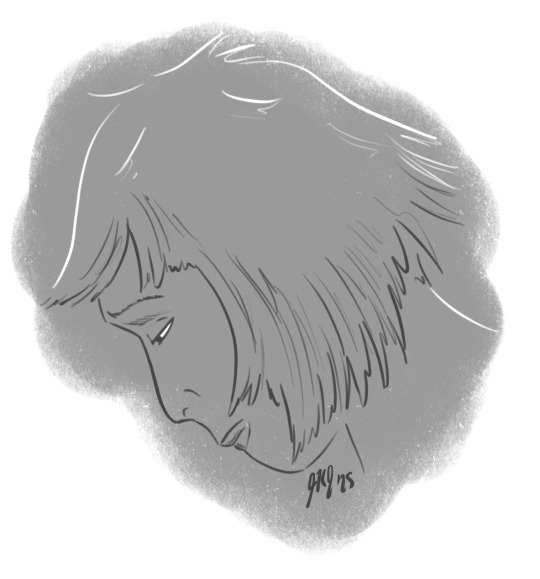
10 notes
·
View notes
Text

Not to toot my own horn too much, but I did good work on these. More of my stuff and art from a bunch of other fans can be found in @thepowercut issue #1
9 notes
·
View notes
Text
Join our Discord!
This was mentioned in the afterword to the zine, but we'd like to spread it further: you can join The Power Cut Discord if you're interested in participating next issue, or just if you want to hang out and discuss The Power Fantasy! Link is here: https://discord.com/invite/YWWP2AQRhp
10 notes
·
View notes
Text
Dialectical Immaterialism
By Tamsyn Elle ( @meserach ), with spot illustrations by Jason K Jones ( @jkjones21 ) and @idonttakethislightly
This essay was originally published on February 14th 2025, in issue #1 of THE POWER CUT, a fanzine about The Power Fantasy, the Image Comics book by Kieron Gillen and Caspar Wijngaard. You can find that zine free to download right here.

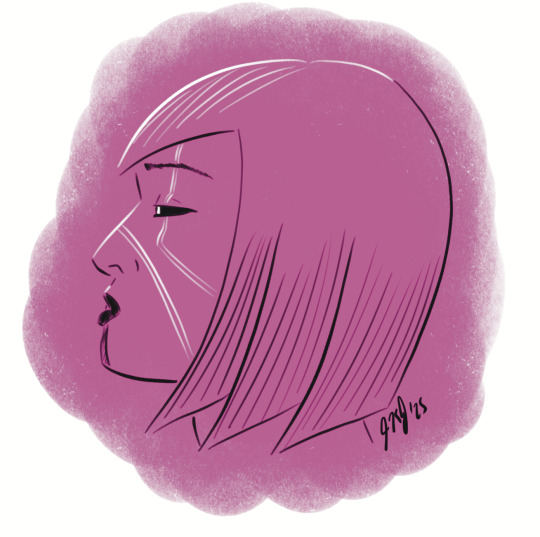
The tagline of The Power Fantasy is “the eternal fight against fighting”. Author Kieron Gillen has described the book, functionally, as being a superhero comic with all the fight scenes removed. This may seem a more audacious move than it is. After all, a truism of narrative is that it’s always about conflict, and surely the fight scenes are where the conflicts of a superhero comic most come to a head. Is The Power Fantasy thus set to be dramatically inert, always trying to avoid pushing things to a point of crisis and resolution?
Well, no. For a start I don’t actually buy the whole “narrative is about conflict” line, necessarily. Certainly stories in which everyone wants the same things and then just does them are going to lack incident, but clearly it doesn't always need to be zero-sum either. More than that, though, conflict actually runs right through this comic. It’s just a conflict that can’t ever come to fullest fruition because then the world ends; but that doesn’t mean we can’t lose a whole goddamn continent. Conflicts that can’t fully resolve can still resolve partially: people can still get what they want, or try to, with alternate avenues, as you can learn either through studying the Cold War or any middle class dinner party. You can do proxy wars. You can do brinkmanship. You can do almost anything.
Our cast still needs something to not quite fight about, though. And here TPF reveals itself as an embarrassment of riches. For our cast of six features no fewer than fifteen unique pairings (I did the maths!), and amongst those it definitely features oppositions. Points of comparison. Dialectics, by which I mean “I’ve read just enough Marx to be dangerous”, or rather I mean something like “opposing forces that act on history and society, producing through their interaction a unique emergent result”. I’m talking about contrasts. The cast of the Power Fantasy is a study in contrasts. In this essay I will…
No but really, look. Valentina and Etienne form an ethical dialectic, Kantian deontology versus utilitarian calculus. I got that one directly from Gillen’s newsletter, so you know it’s real.
Heavy and Jacky are two takes on the destiny of the 60s-70s counterculture post-1980. Drop out or sell out: leave common society and start your own place that can actually serve your ideals (and then defend it fiercely from the people who will inevitably attempt to destroy it) or in some way become reconciled to power. They’re two different kinds of cult leader.
Valentina and Eliza are literally an angel and a demon. Look, sometimes it isn't subtle. (Not that we can yet fully grasp what those things mean in this cosmology, mind you.)
Somewhat subtler is the contrast flagged up in the conversation between Masumi and Etienne Lux in issue #2. Lux means light, natch. Etienne has a brain that's all light, all sharp angles and clear delineations and clarity, networking everyone like fiber optics, learning everything. Masumi's mind, by contrast, is “a void from which no light escapes”.

Etienne and Heavy form a dualism of responses to being part of a marginalised population: one similar to the Professor X/Magneto dualism which is an obvious partial inspiration for the two characters and their relationship, plus their power sets. Much has been written about this dualism before and will be again (to say nothing of the supposed Malcom X vs Martin Luther King dualism which inspired Magneto and Professor X in turn) so I can’t possibly hope to summarise all of it here, but in very brief: it’s a split between ways a marginalised population (atomics/mutants/people of colour) should interact with their oppressors - with strength, violence, and demanding concessions, or with something subtler, more peaceable and reasonable - as Etienne puts it, being someone “governments can work with”.
Lux and Magus! Their similarity has already been stressed: Magus calls them the two smartest guys in the room. Both are manipulating people, controlling the flow of information carefully, the ones most obviously managing people. But for all Magus’ cynicism, he was the one to cry for the losses after the Second Summer of Love… which of them truly cares more about people? And in what ways? But I’m getting ahead of myself. See their essays, in the exciting pages to come!
Considering the dyads of the cast throws up other ideas. What if you compare Heavy to Masumi? They’ve scarcely interacted thus far, but what shows up if you contrast them? I’d suggest maybe the idea of power as a curse versus power as a tool of liberation. But also there’s something in the idea that the two of them are just barely holding themselves together: Masumi mentally, Heavy physically.
Masumi hasn’t had vast opportunity to rub against Magus and Valentina yet, but doubtless there will be contrasts and comparators there too. Certainly all three work hard, in their separate ways, to contain a destructive force - or at least something they see as destructive. Magus works to amass power because he fears others having it; Masumi wants only to be rid of her power and is afraid mostly of herself. Valentina is a protective figure who at least sometimes is adored by the public - check that graffiti in issue #1 in 1966! - while Masumi is hated and feared.

Yet despite this Valentina ends up in space, held isolated from the world to protect others from being her collateral damage; while Masumi can only be contained by keeping her enmeshed in the very social context Valentina craves to be part of.
Eliza is the enigma of our cast, having had the least focus thus far, so it’s not yet clear exactly how she’ll be providing contrasts. We can speculate: she’s a person who’s done something bad, something sinful, towards a good end, which rubs interestingly with Etienne’s sense of himself as an ethical rather than a good person. Her evident faith places her at odds with Jacky’s cynicism, perhaps. Maybe there’s something in comparing her and Masumi as both carrying around a monster of some kind, a difference in how they both feel about being marked or “fallen”. And with Heavy … is there something about martyrdom? Although all the cast are martyrs to some extent…

There’s contrasting groupings, too. The data page I’ve scrawled on over there gave us one: the atomics vs. the extradimensionals. But there’s more. There’s a distinction between Magus and Eliza and the other four: Magus and Eliza sought power, or bargained or worked to get it; the other four were, as far as we know, born into their power (Valentina) or developed it naturally during childhood (the Atomics). There’s the contrast between the superpowers who are considered problems to be managed (Heavy and Masumi) and the people who do the managing (Etienne, Valentina and Magus). There’s obviously a gender split (and never doubt a Kieron Gillen comic will have at least a little about gender in it).
One division I really like is the divide between those who really need other people around them (Jacky Magus and his Pyramid, Heavy and his Family, Masumi and her Isabella) and those who's isolation is more stressed: Etienne, Valentina and Eliza. All the cast are isolated to some extent, in their nature as singular superpowers, six against billions. But their attitudes and needs towards that are where this separation lies: in different ways Heavy, Masumi and Magus all crave people and surround themselves with them; Etienne and Valentina both like people but are held apart from them.
So, pairs of opposites. Groups of opposites. But are there oppositions inside each of our superpowers as well? Yes, that’s why I asked. The power of rhetoric! The oppositions inside each of our main cast - the contradictions and conflicts of their being, is, it turns out, our theme for this inaugural issue of THE POWER CUT, which it thrills me to always type in all caps. This theme was a surprise to me, but it was emerging naturally from what we were writing about anyway, and I’ve learned to honour the magic in such things. For this reason, the oppositional theme, we’ve called this issue “The Balancing Act”, because that’s also a quote from Etienne in issue #1. It being a reference makes what we’re doing literature, I think.
So! Here it is, our inaugural issue. Have a read, why don’t you. Explore the pages. We’ve got substantial essays on each of our main six cast, some other writing, and lots of lovely art. If it’s a success (by what metric exactly? Artistically, I guess?) I for one would like to do one for every trade paperback that comes out. If you’re interested in contributing to the next one, we’re interested in having you! We have a Discord and a Tumblr and whatnot. There’s going to be lots to talk about: I think this comic is going to be a long haul, one way or another. These six haven’t finished rubbing up against each other yet.
… that sounds sexier than I meant it. Well, it is Valentine’s Day. (ED: this worked better at time of original publication).
#the power fantasy#caspar wijngaard#kieron gillen#image comics#indie comics#fandom zine#fanzine#zine
22 notes
·
View notes
Text

These are the headshot portraits I was asked to do for @thepowercut fanzine! I was inspired by the graphic style portrait of Kieron’s that Rian Hughes did for the back matter essays that punctuate each issue. It was fun working in just black and white on these monochrome backgrounds!
8 notes
·
View notes
Text
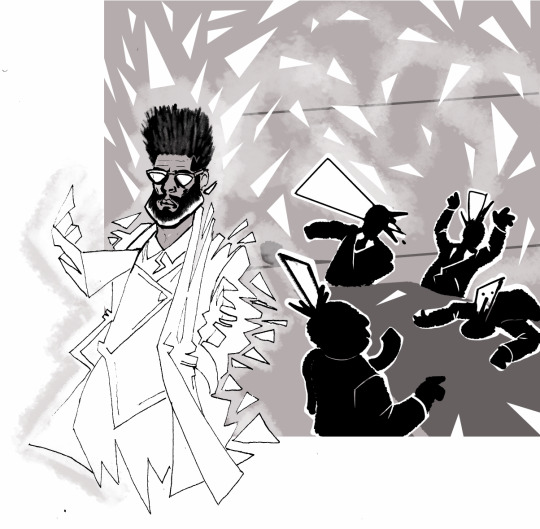

Interior illustrations of Etienne Lux and Major Glenn Campbell from The Power Fantasy, produced for @thepowercut zine. Out today!
69 notes
·
View notes